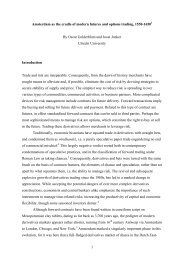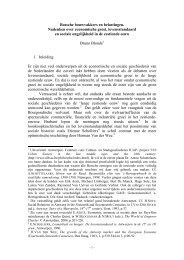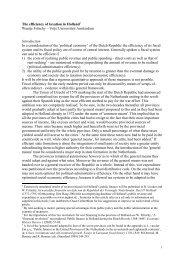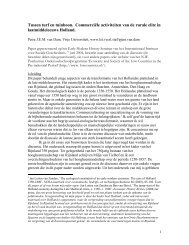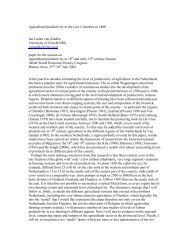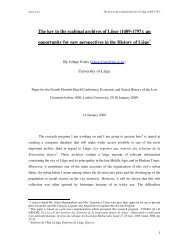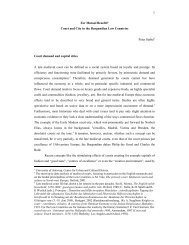Justyna Wubs-Mrozewicz LOOKING TWICE - Economy and Society ...
Justyna Wubs-Mrozewicz LOOKING TWICE - Economy and Society ...
Justyna Wubs-Mrozewicz LOOKING TWICE - Economy and Society ...
You also want an ePaper? Increase the reach of your titles
YUMPU automatically turns print PDFs into web optimized ePapers that Google loves.
Looking twice, <strong>Justyna</strong> <strong>Wubs</strong>-<strong>Mrozewicz</strong> January 2009<br />
Holl<strong>and</strong>ers were in practice denied the right to trade in winter. 53 And as stated before, winter<br />
residence was crucial for conducting efficient trade in Bergen. In the 1560 edict, which<br />
defined the Amsterdam trade until the end of the sixteenth century, 54 the king was openly<br />
choosing sides between the Amsterdammers <strong>and</strong> the Hanseatic merchants in Bergen. Like his<br />
predecessor in 1469, he offered an explanation of his choice, pointing out the crucial role<br />
which Hansards continued to play in the town. He stated that, as the importers of all kinds of<br />
needed goods, Hansards simply could not be missed in the Bergen economy, <strong>and</strong> therefore<br />
only they were permitted winter residence <strong>and</strong> winter trade. 55 It appears that the rulers of<br />
Norway made a clear choice between the two groups of foreigners, <strong>and</strong> were far more prone<br />
to curtail the rights of Holl<strong>and</strong>ers than Hansards. 56 One of the conclusions of my dissertation<br />
is that the case of Bergen privileges illustrates well how the Hanse-Holl<strong>and</strong> balance depended<br />
on local conditions. 57<br />
II. THE CREDIT SYSTEM<br />
The so-called credit system was one of the cornerstones of the Bergen foreign trade, <strong>and</strong> was<br />
closely connected to the privileges of foreign merchants there. Specifically, to the<br />
aforementioned rights of winter residence <strong>and</strong> the prohibition of trade outside of Bergen. The<br />
credit system shaped the conditions of stockfish-grain exchange in Bergen, <strong>and</strong> those who<br />
could not or would not participate in it, had to resign to a inferior place on the mercantile<br />
ladder. Eventually, some of the foreigners – amongst them Holl<strong>and</strong>ers – started to seek their<br />
fortune elsewhere.<br />
While the employment of credit was widespread both in mercantile Europe in general<br />
<strong>and</strong> in the Hanse, 58 the credit system in the Hanseatic Kontor in Bergen was a unique<br />
53<br />
NRR 1 pp. 287 <strong>and</strong> 297. Like in the 1507 privilege, only three to four Holl<strong>and</strong>ers were allowed to stay the<br />
winter in order to safeguard their goods. Yet under the new interpretation of the 1507 privilege, they were no<br />
longer permitted to trade during that season.<br />
54<br />
Schreiner, Hanseatene og Norge, pp. 349-350; S. Sogner, ‘Hollendertid og skottetid’, in: Kjeldstadli e.a. (eds.)<br />
Norsk innv<strong>and</strong>ringshistorie, pp. 297-303.<br />
55<br />
H<strong>and</strong>vesten, vol. 1 pp. 59-60; DNT 1 p. 663.<br />
56<br />
Schreiner, Hanseatene og Norge, pp. 288-295; Nedkvitne, Utenriksh<strong>and</strong>elen, p. 334; Blom, ‘Norge’, p. 53.<br />
Yet it must be pointed out that the real winners in the trade politics game in Bergen from the 1540s on were not<br />
Hansards or Holl<strong>and</strong>ers, but Bergen burghers, see <strong>Wubs</strong>-<strong>Mrozewicz</strong>, Traders, Ties <strong>and</strong> Tensions, pp. 57-59, 77-<br />
80.<br />
57<br />
<strong>Wubs</strong>-<strong>Mrozewicz</strong>, Traders, Ties <strong>and</strong> Tensions, p. 81.<br />
58<br />
Spufford, Power <strong>and</strong> Profit. The Merchant in Medieval Europe; Hunt <strong>and</strong> Murray, A History of Business in<br />
Medieval Europe, 1200-1550, pp. 65-66, 160. See the analyses dismissing the older view that Hansards were in<br />
general against using credit: M. North, ‘Kreditinstrumente in Westeuropa und im Hanseraum’, in: Jörn e.a. (eds.)<br />
‘kopet uns werk by tyden’; S. Jenks, ‘War die Hanse kreditfeindlich?’, Vierteljahresschrift für Sozial- und<br />
Wirtschaftsgeschichte 69, 1982.<br />
8



